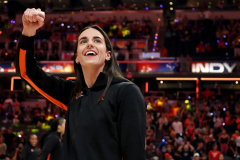
INDIANAPOLIS, INDIANA – JULY 19: Caitlin Clark #22 of the Indiana Fever looks on during the 2025 AT&T WNBA All-Star Game at Gainbridge Fieldhouse on July 19, 2025 in Indianapolis, Indiana.
Getty Images
There’s no denying that Caitlin Clark’s legendary run with the Iowa Hawkeyes helped launch her from college stardom to a thriving professional career with the Indiana Fever. After all, Clark was recently named one of Forbes Most Powerful Women in Sports and earned an estimated $8.1 million during her first professional season. Meanwhile, 23-time Grand Slam champion Serena Williams also earned a spot on this year’s Most Powerful Women in Sports list in addition to being among Forbes Richest Self-Made Women, with an estimated net worth of $350 million for 2025. Williams leveraged her highly successful professional athletic career to launch Serena Ventures, a venture capital fund that has provided $111 million in funding since its launch and boasts a portfolio of 85 startups, a majority of which are women-led.
Clark and Williams are just two particularly visible examples of women who have translated strong athletic careers into professional success well beyond the court (or field). Gail K. Boudreaux, a former college basketball player and all-time leading scorer for the Dartmouth Big Green, is now the President and CEO of S&P 500 health insurance company, Elevance Health. Boudreaux also ranks among Forbes’ World’s Most Powerful Women.
Similarly, Lisa Palmer, President and CEO of S&P 500 REIT Regency Centers Corporation, was a standout softball player at the Wharton School of the University of Pennsylvania and credits her leadership skills to lessons learned on the field. In an article from the International Council of Shopping Centers (ICSC), Palmer explained that her leadership journey began as a softball pitcher, noting that “pitchers specifically are looked to as leaders in softball.”
Women Athletes are a Leading Force Behind Corporate America’s Playbook
Both Boudreaux and Palmer’s experiences underscore how skills developed through women’s sports can serve as a strong foundation for corporate leadership. And there’s data to back up this connection. According to Women Business Collaborative’s (WBC’s) “Women CEOs in America 2025 Report,” 9.2% of CEOs across the Fortune 1000, S&P 500, Russell 3000, and private companies with revenues exceeding $1 billion are women. Of that group, 10.2% have a collegiate or elite athletic background, with more than half leading in the healthcare, consumer goods, and technology sectors.
Women’s Sports are the Training Ground for Tomorrow’s Leaders
Athletes get an early start in developing critical skills that prepare them for leadership, learning key skills not only in classrooms, offices or boardrooms, but from a younger age on the playing field. Women’s Sports Foundation’s “Play to Lead” survey found that nearly half of women respondents credit the skills they gained through sports for their leadership development. Of those who participated in sports during their formative years, nearly half went on to hold leadership positions in the workplace, including c-suite, founder, president, vice president and board member roles.
There are several skills that women athletes develop through sports that are transferable to leadership. In its report, the WBC highlights the skills that women athlete-leaders identify as key to advancing their careers, including teamwork and collaboration, resilience, adaptability, confidence, decision-making, performance measurement and feedback, and the ability to develop a strategic vision. These lessons and skills learned in sports can directly translate into effe





